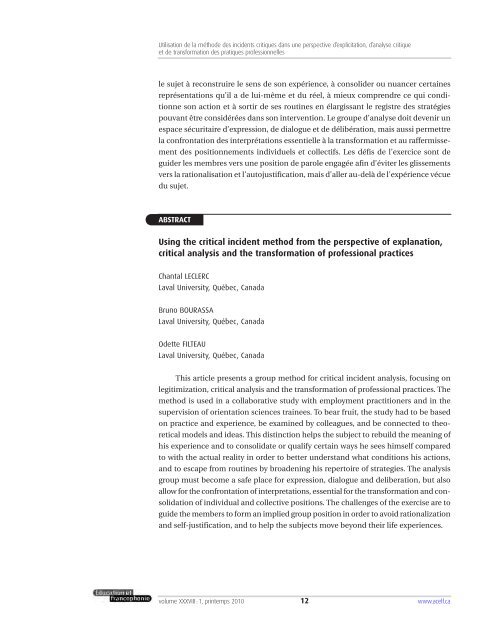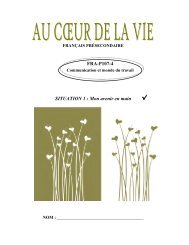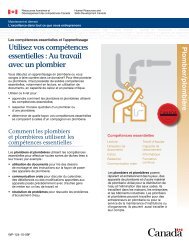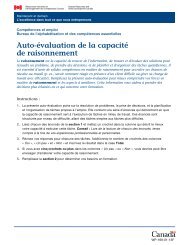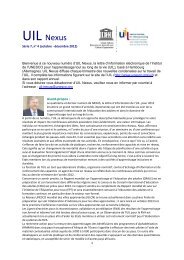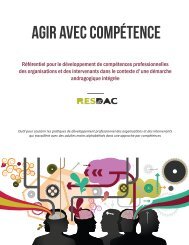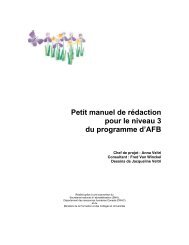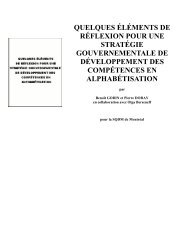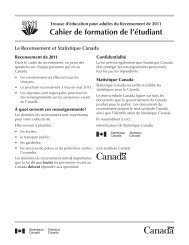Utilisation de la méthode des incidents critiques dans une ...
Utilisation de la méthode des incidents critiques dans une ...
Utilisation de la méthode des incidents critiques dans une ...
You also want an ePaper? Increase the reach of your titles
YUMPU automatically turns print PDFs into web optimized ePapers that Google loves.
<strong>Utilisation</strong> <strong>de</strong> <strong>la</strong> métho<strong>de</strong> <strong>de</strong>s inci<strong>de</strong>nts <strong>critiques</strong> <strong>dans</strong> <strong>une</strong> perspective d’explicitation, d’analyse critique<br />
et <strong>de</strong> transformation <strong>de</strong>s pratiques professionnelles<br />
le sujet à reconstruire le sens <strong>de</strong> son expérience, à consoli<strong>de</strong>r ou nuancer certaines<br />
représentations qu’il a <strong>de</strong> lui-même et du réel, à mieux comprendre ce qui conditionne<br />
son action et à sortir <strong>de</strong> ses routines en é<strong>la</strong>rgissant le registre <strong>de</strong>s stratégies<br />
pouvant être considérées <strong>dans</strong> son intervention. Le groupe d’analyse doit <strong>de</strong>venir un<br />
espace sécuritaire d’expression, <strong>de</strong> dialogue et <strong>de</strong> délibération, mais aussi permettre<br />
<strong>la</strong> confrontation <strong>de</strong>s interprétations essentielle à <strong>la</strong> transformation et au raffermissement<br />
<strong>de</strong>s positionnements individuels et collectifs. Les défis <strong>de</strong> l’exercice sont <strong>de</strong><br />
gui<strong>de</strong>r les membres vers <strong>une</strong> position <strong>de</strong> parole engagée afin d’éviter les glissements<br />
vers <strong>la</strong> rationalisation et l’autojustification, mais d’aller au-<strong>de</strong>là <strong>de</strong> l’expérience vécue<br />
du sujet.<br />
ABSTRACT<br />
Using the critical inci<strong>de</strong>nt method from the perspective of exp<strong>la</strong>nation,<br />
critical analysis and the transformation of professional practices<br />
Chantal LECLERC<br />
Laval University, Québec, Canada<br />
Bruno BOURASSA<br />
Laval University, Québec, Canada<br />
O<strong>de</strong>tte FILTEAU<br />
Laval University, Québec, Canada<br />
This article presents a group method for critical inci<strong>de</strong>nt analysis, focusing on<br />
legitimization, critical analysis and the transformation of professional practices. The<br />
method is used in a col<strong>la</strong>borative study with employment practitioners and in the<br />
supervision of orientation sciences trainees. To bear fruit, the study had to be based<br />
on practice and experience, be examined by colleagues, and be connected to theoretical<br />
mo<strong>de</strong>ls and i<strong>de</strong>as. This distinction helps the subject to rebuild the meaning of<br />
his experience and to consolidate or qualify certain ways he sees himself compared<br />
to with the actual reality in or<strong>de</strong>r to better un<strong>de</strong>rstand what conditions his actions,<br />
and to escape from routines by broa<strong>de</strong>ning his repertoire of strategies. The analysis<br />
group must become a safe p<strong>la</strong>ce for expression, dialogue and <strong>de</strong>liberation, but also<br />
allow for the confrontation of interpretations, essential for the transformation and consolidation<br />
of individual and collective positions. The challenges of the exercise are to<br />
gui<strong>de</strong> the members to form an implied group position in or<strong>de</strong>r to avoid rationalization<br />
and self-justification, and to help the subjects move beyond their life experiences.<br />
volume XXXVIII : 1, printemps 2010<br />
12<br />
www.acelf.ca


